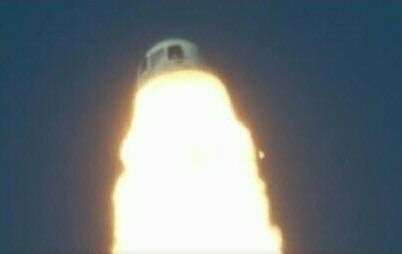This article has been reviewed according to Science X's editorial process and policies. Editors have highlighted the following attributes while ensuring the content's credibility:
fact-checked
reputable news agency
proofread
Blue Origin hopes to resume space flights 'soon' after 2022 accident

Jeff Bezos' space company Blue Origin said Friday it hopes to resume rocket flights "soon" following the conclusion of an investigation into a crash last year—but it must wait for US regulators to accept the findings.
The company's New Shepard suborbital rockets, which are intended for space tourism among other purposes, have been grounded following the September 2022 accident that occurred shortly after liftoff from Texas.
The incident marked a setback for the Amazon founder's company, though observers were encouraged by the fact that had people been aboard, they would have likely survived.
The flight's rocket consisted of a single booster, with Blue Origin's NS-23 capsule on top carrying a scientific payload.
During the mission, an anomaly occurred as the rocket was climbing, appearing to stall as it experienced a technical issue.
The capsule then initiated its escape sequence and outsped the booster, falling back to Earth, slowed by parachutes.
Blue Origin noted at the time that the booster "impacted the ground" instead of landing upright as it normally does.
An investigation was subsequently conducted with oversight from the regulatory Federal Aviation Administration (FAA).
The FAA said Friday its probe remains open and that it was "currently reviewing the company's submission of its mishap report."
"FAA approval is required to close the investigation and for the New Shepard System to return to flight," it said in a statement.
'Thrust misalignment'
Blue Origin said the anomaly was caused by a "thermo-structural failure of the engine nozzle," referring to the duct through which burning gases are ejected.
This, in turn, resulted in a "thrust misalignment" that triggered the capsule escape system.
Failure of the nozzle was caused by temperatures that were higher than expected, the investigation concluded, indicating that "design changes" should prevent the problem in the future.
It also reiterated that the capsule and its payload "landed safely," thanks to an escape system that "worked as designed."
Blue Origin said it "expects to return to flight soon" reflying the same NS-23 payloads.
In all, Blue Origin has flown 32 people—some as paying customers and others as guests—since July 2021, when Bezos himself took part in the first flight.
© 2023 AFP




















